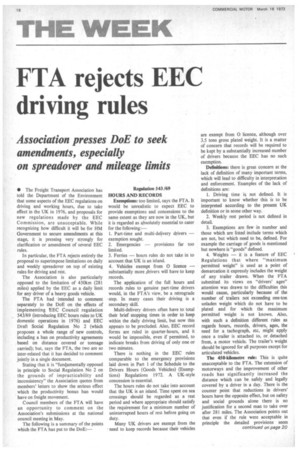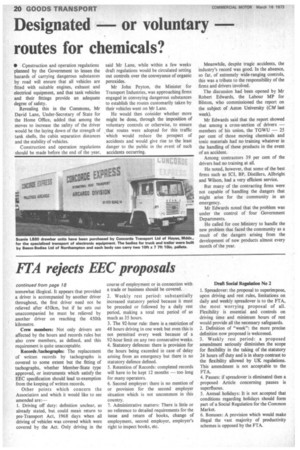FTA rejects EEC driving rules
Page 20

Page 22

If you've noticed an error in this article please click here to report it so we can fix it.
• Association presses DoE to seek amendments, especially on spreadover and mileage limits
• The Freight Transport Association has told the Department of the Environment that some aspects of the EEC regulations on driving and working hours, due to take effect in the UK in 1976, and proposals for new regulations made by the EEC Commission, are unacceptable. While recognizing how difficult it will be for HM Government to secure amendments at this stage, it is pressing very strongly for clarification or amendment of several EEC rules.
In particular, the FTA rejects entirely the proposal to superimpose limitations on daily and weekly spreadover on top of existing rules for driving and rest.
The Association is also particularly opposed to the limitation of 450km (281 miles) applied by the EEC as a daily limit for any driver of a heavy goods vehicle.
The FTA had intended to comment separately to the DoE on the effects of implementing EEC Council regulation 543/69 (introducing EEC hours rules to UK domestic operations in 1976) and EEC Draft Social Regulation No 2 (which proposes a whole range of new controls, including a ban on productivity agreements based on distance covered or tonnage carried); but, says the FTA, the two are so inter-related that it has decided to comment jointly in a single document.
Stating that it is "fundamentally opposed in principle to Social Regulation No 2 on the grounds of impracticability and inconsistency" the Association quotes from members' letters to show the serious effect which the productivity bonus ban would have on freight movement.
Council members of the FTA will have an opportunity to comment on the Association's submissions at the national council meeting in May.
The following is a summary of the points which the FTA has put to the DoE:— Regulation 543/69 HOURS AND RECORDS Exemptions: too limited, says the FTA. It would be unrealistic to expect EEC to provide exemptions and concessions to the same extent as they are now in the UK, but it is regarded as absolutely essential to cater for the following: 1. Part-time and multi-delivery drivers — exemption sought.
2. Emergencies — provisions far too limited.
3. Ferries — hours rules do not take in to account that UK is an island.
4. Vehicles exempt from 0 licence — substantially more .drivers will have to keep records.
The application of the full hours and records rules to genuine part-time drivers would, in the PTA's view, be a retrograde -step. In many cases their driving is a secondary skill.
Multi-delivery drivers often have to total their brief stopping times in order to keep within the daily driving limit, but now this appears to be precluded. Also, EEC record forms are ruled in quarter-hours, and it would be impossible, even if permitted, to indicate breaks from driving of only one or two minutes.
There is nothing in the EEC rules comparable to the emergency provisions laid down in Part 1 of the Schedule to the Drivers Hours (Goods Vehicles) (Exemptions) Regulations 1972. A UK-style concession is essential.
The hours rules do not take into account that the UK is an island. Time spent on sea crossings should be regarded as a rest period and where appropriate should satisfy the requirement for a minimum number of uninterrupted hours of rest before going on duty.
Many UK drivers are exempt from the need to keep records because their vehicles are exempt from 0 licence, although over 3.5 tons gross plated weight. It is a matter of concern that records will be required to be kept by a substantially increased number of drivers because the EEC has no such exemption.
Definitions: there is great concern at the lack of definition of many important terms, which will lead to difficulty in interpretation and enforcement. Examples of the lack of definitions are: 1. Driving time is not defined. It is important to know whether this is to be interpreted according to the present UK definition or in some other way.
2. Weekly rest period is not defined in detail.
3. Exemptions are few in number and those which are listed include terms which are not, but which need to be, defined. For example the carriage of goods is mentioned but nowhere is "goods" defined.
4. Weights — it is a feature of EEC Regulations that where "maximum permitted weight" is used as a point of demarcation it expressly includes the weight of any trailer drawn. When the FTA submitted its views on "drivers' ages" attention was drawn to the difficulties this would cause, particularly because of the number of trailers not exceeding one-ton unladen weight which do not have to be plated and for which the maximum permitted weight is not known. Also, with such a definition different rules as regards hours, records, drivers, ages, the need for a tachograph, etc, might apply once a trailer is attached to, or, detached from, a motor vehicle. The trailer's weight should be ignored for all purposes except for articulated vehicles.
The 450-kilometre rule: This is quite unacceptable to the FTA. The extension of motorways and the improvement of other roads has significantly increased the distance which can be safely and legally covered by a driver in a day. There is the counter point that reductions in drivers' hours have the opposite effect, but on safety and social grounds alone there is no justification for a second man to take over after 281 miles. The Association points out that even if the rule were acceptable in principle the detailed provisions seem
continued from page 18 somewhat illogical. It appears that provided a driver is accompanied by another driver throughout, the first driver need not be relieved after 450km, but if he sets out unaccompanied he must be relieved by another driver on reaching the 450th kilometre.
Crew members: Not only drivers are affected by the hours and records rules but also crew members, as defined, and this requirement is quite unacceptable.
Records /tachographs: The replacement of written records by tachographs is covered to some extent but the fitting of tachographs, whether Member-State type approved, or instruments which satisfy the EEC specification should lead to exemption from the keeping of written records.
Other points which concern the Association and which it would like to see amended are: 1. Driving off duty: definition unclear, as already stated, but, could mean return to pre-Transport Act, 1968 days when all driving of vehicles was covered which were covered by the Act. Only driving in the course of employment or in connection with a trade or business should be covered.
2. Weekly rest period: substantially increased statutory period because it must be preceded or followed by a daily rest period, making a total rest period of as much as 35 hours.
3. The 92-hour rule: there is a restriction of 48 hours driving in one week but even this is not permitted every week because of a 92-hour limit on any two consecutive weeks.
4. Statutory defences: there is provision for the hours being exceeded in case of delay arising from an emergency but there is no statutory defence defined.
5. Retention of Records: completed records will have to be kept 12 months — too long for many operators.
6. Second employer: there is no mention of or provision for the second employer situation which is not uncommon in this country.
7. Administrative matters: There is little or no reference to detailed requirements for the issue and return of books, change of employment, second employer, employer's right to inspect books, etc. Draft Social Regulation No 2 I. Spreadover: the proposal to superimpose, upon driving and rest rules, limitations on daily and weekly spreadover is to the PTA, the most worrying proposal of all. Flexibility is essential and controls on driving time and minimum hours of rest would provide all the necessary safeguards.
2. Definition of "week": the more precise definition now proposed is welcomed.
3. Weekly rest period: a proposed amendment seriously diminishes the scope for flexibility in the taking of the statutory 24 hours off duty and is in sharp contrast to the flexibility allowed by UK regulations. This amendment is not acceptable to the PTA.
4. Pauses: if spreadover is eliminated then a proposed Article concerning pauses is superfluous.
5. Annual holidays: It is not accepted that conditions regarding holidays should form part of a Social Regulation for the Common Market.
6. Bonuses: A provision which would make illegal the vast majority of productivity schemes is opposed by the PTA.
























































































































